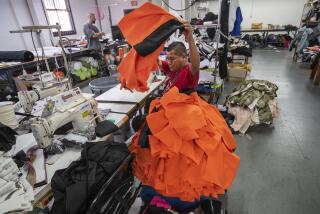Inventories Edge Up 0.5% During August
WASHINGTON — Business inventories inched upward 0.5% in August despite a 2.1% gain in sales, the government said Monday. Analysts said that while the imbalance bears watching, it was not at a dangerous level.
Analysts watch for signs of undue inventory growth during periods of economic weakness because unusually large backlogs could cause production cutbacks and loss of jobs, adding even more stress to the economy.
Some analysts believe that the economy is headed toward a recession this year--if it is not already in one.
But Michael Boskin, President Bush’s chief economic adviser, told an American Stock Exchange conference on Monday that he expected the economy to skirt a downturn.
“Even though it is particularly difficult to forecast the short-term course of the economy . . . by our best estimate the economy is going to grow weakly in the fourth quarter of 1990 and early 1991,” he said. “I do believe the third quarter data . . . will show that the economy continued to grow.”
The Commerce Department said inventories held on shelves and back lots in August totaled a seasonally adjusted $806.5 billion, up from $802.2 billion the previous month.
But the 0.5% gain in August slowed slightly from a 0.7% increase in July, which had been the largest since an 0.8% advance in July 1989.
At the same time, the department said sales totaled a seasonally adjusted $551.9 billion, up from $540.4 billion in July. July sales had declined a revised 0.4% rather than the 0.5% first reported last month.
The activity pushed the ratio of inventories to sales down to 1.46 from a 1.48 level in July. The ratio means it would take 1.46 months to exhaust the backlog of goods at the August sales pace.
The increased inventories “is another indicator, a sign of a troubled economy,” said Thomas Runiewicz, an economist with the WEFA Group in Bala-Cynwyd, Pa.
But he also noted that industry has “become much more efficient in terms of managing inventories and keeping them low” and that the situation is not as critical as it would have been a few years ago.
More to Read
Inside the business of entertainment
The Wide Shot brings you news, analysis and insights on everything from streaming wars to production — and what it all means for the future.
You may occasionally receive promotional content from the Los Angeles Times.










